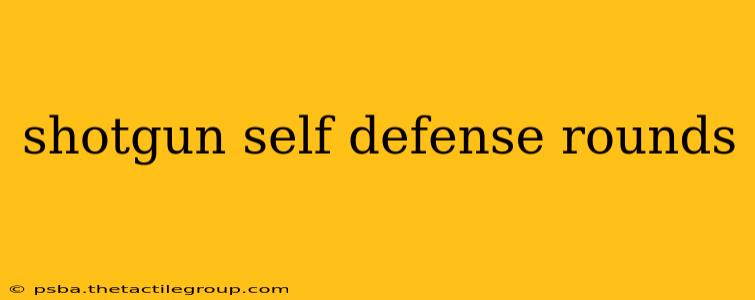Choosing the right ammunition for self-defense is a critical decision, and for shotgun users, that choice becomes even more nuanced. This guide delves into the world of shotgun self-defense rounds, exploring various options, their effectiveness, and the factors to consider when making your selection. Understanding these factors will allow you to make an informed decision based on your specific needs and circumstances.
Understanding Shotgun Self-Defense Needs
Before diving into specific ammunition types, it's essential to understand the unique challenges and requirements of self-defense situations. Unlike hunting, where a clean kill is the primary objective, self-defense scenarios demand immediate incapacitation and a minimal risk of overpenetration. The goal is to stop a threat quickly and safely, without jeopardizing innocent bystanders.
Key Considerations:
- Stopping Power: The ability of a round to quickly incapacitate a threat is paramount. This involves factors like projectile energy transfer and the round's ability to cause significant tissue damage.
- Pattern Density: A tight, consistent shot pattern is crucial for accuracy and effectiveness at close range, common in self-defense situations. A widely dispersed pattern reduces the chances of hitting the target effectively.
- Penetration: Overpenetration is a significant concern in self-defense. A round that travels too far through the intended target poses a considerable risk to those behind it. The ideal round balances stopping power with controlled penetration.
- Recoil: While not directly related to the round itself, recoil management is a crucial aspect of self-defense. Excessive recoil can negatively impact follow-up shots, especially under stress. Choosing ammunition with manageable recoil is therefore important.
Types of Shotgun Self-Defense Rounds
The market offers a vast array of shotgun shells specifically designed for self-defense. These generally fall into several categories:
1. Buckshot:
- Description: Buckshot rounds contain multiple lead or other metal pellets within a single shell. The number of pellets and their size vary (e.g., 00 buck, #1 buck, #4 buck).
- Pros: High stopping power at close range due to multiple projectiles.
- Cons: Significant recoil, potential for overpenetration, especially with larger pellets like 00 buck. Pattern density can be affected by distance and choke.
2. Birdshot:
- Description: Smaller pellets (like #7.5 or #8) are ideal for smaller game, but generally lack sufficient stopping power for self-defense.
- Pros: Lower recoil, less penetration than buckshot.
- Cons: Insufficient stopping power for most self-defense scenarios. Not recommended.
3. Slug Rounds:
- Description: A single, larger projectile designed for longer-range accuracy. Solid slugs or rifled slugs are common options.
- Pros: Excellent range and accuracy compared to buckshot or birdshot.
- Cons: Very high recoil, increased risk of overpenetration, potentially limited effectiveness at extremely close range due to a single projectile. Generally, not ideal for confined spaces.
4. Less-Lethal Options:
- Description: Rubber bullets, bean bag rounds, and other less-lethal options are available.
- Pros: Reduce the risk of serious injury or death.
- Cons: May not be effective in stopping a determined attacker. Legal implications and effectiveness vary significantly by jurisdiction.
Choosing the Right Ammunition for You
Selecting the best self-defense shotgun ammunition is a deeply personal decision influenced by individual circumstances, training, and legal considerations. Factors like your home's layout, the potential for overpenetration, and your level of proficiency with your firearm all play a critical role.
Consider these factors:
- Your training and experience: Adequate training is crucial for safe and effective use of any firearm, particularly shotguns.
- Your environment: The layout of your home and the potential presence of others nearby heavily influences your ammunition choice.
- Legal considerations: Local laws concerning self-defense and the use of certain ammunition types vary widely. Be sure to consult local regulations before making any decisions.
It's strongly recommended to consult with experienced firearms instructors and law enforcement professionals before choosing self-defense ammunition. They can offer personalized advice and guidance based on your specific needs and situation. This is not a decision to be taken lightly. Your safety and the safety of those around you are paramount.

